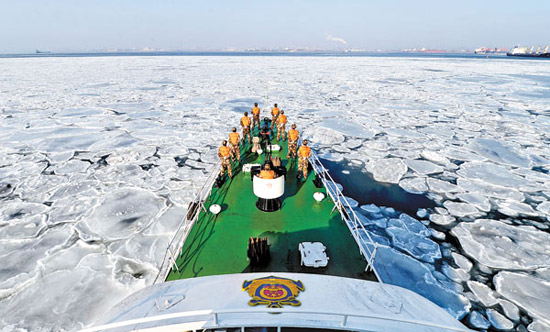
 |
| Ice forming in Bohai Bay has affected shipping off Qinhuangdao in Hebei province, as conditions are monitored by a marine police vessel on Tuesday.(Xinhua/Yang Shiyao) |
Frozen seas off the coast of China are expected to expand to severe levels in late January, posing threats to offshore oil and gas fields, leaving thousands of ships stranded and affecting aquaculture farms.
"Although the temperature has stopped decreasing, sea ice has been continuing to grow," Zhang Qiwen, a sea ice expert at the National Marine Environmental Forecasting Center, told China Daily on Tuesday.
The peak of this year's sea ice may be similar to the level in 2010 when about 90 percent of Bohai Bay was covered by ice, the worst freeze in the bay in the past 30 years, according to Zhang.
Although there are no reports of oil or gas fields halting operations in China, sea ice experts at the center checked offshore oilfields on Tuesday, studying the situation and arranging icebreakers to guarantee operations.
Due to frequent cold snaps and precipitation over the past few weeks, the ice at Liaodong Bay stretched 100 kilometers from the coast on Tuesday, according to the center's latest satellite image.
The image showed ice in Bohai Bay reached 15,231 square km on Tuesday, about twice the average area for the same day in the past 25 years.
Thousands of fishing boats were frozen at ports in Tianjin and small cruise ships have suspended operations for safety reasons.















 Spring Festival draws near, immigrant workers have begun to go home, leading a travel peak at the railway station.
Spring Festival draws near, immigrant workers have begun to go home, leading a travel peak at the railway station.


![]()
